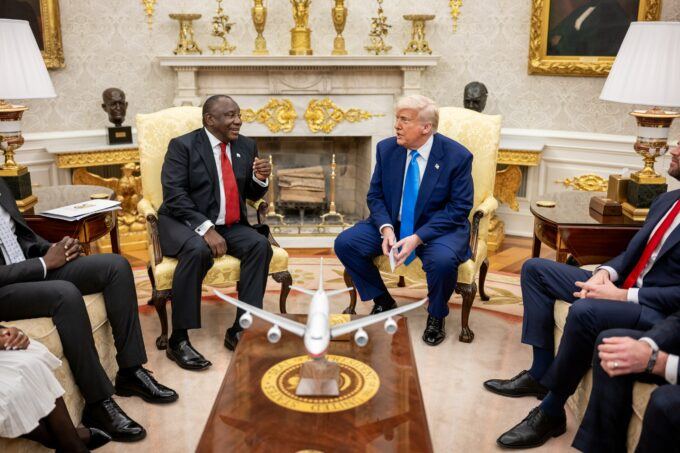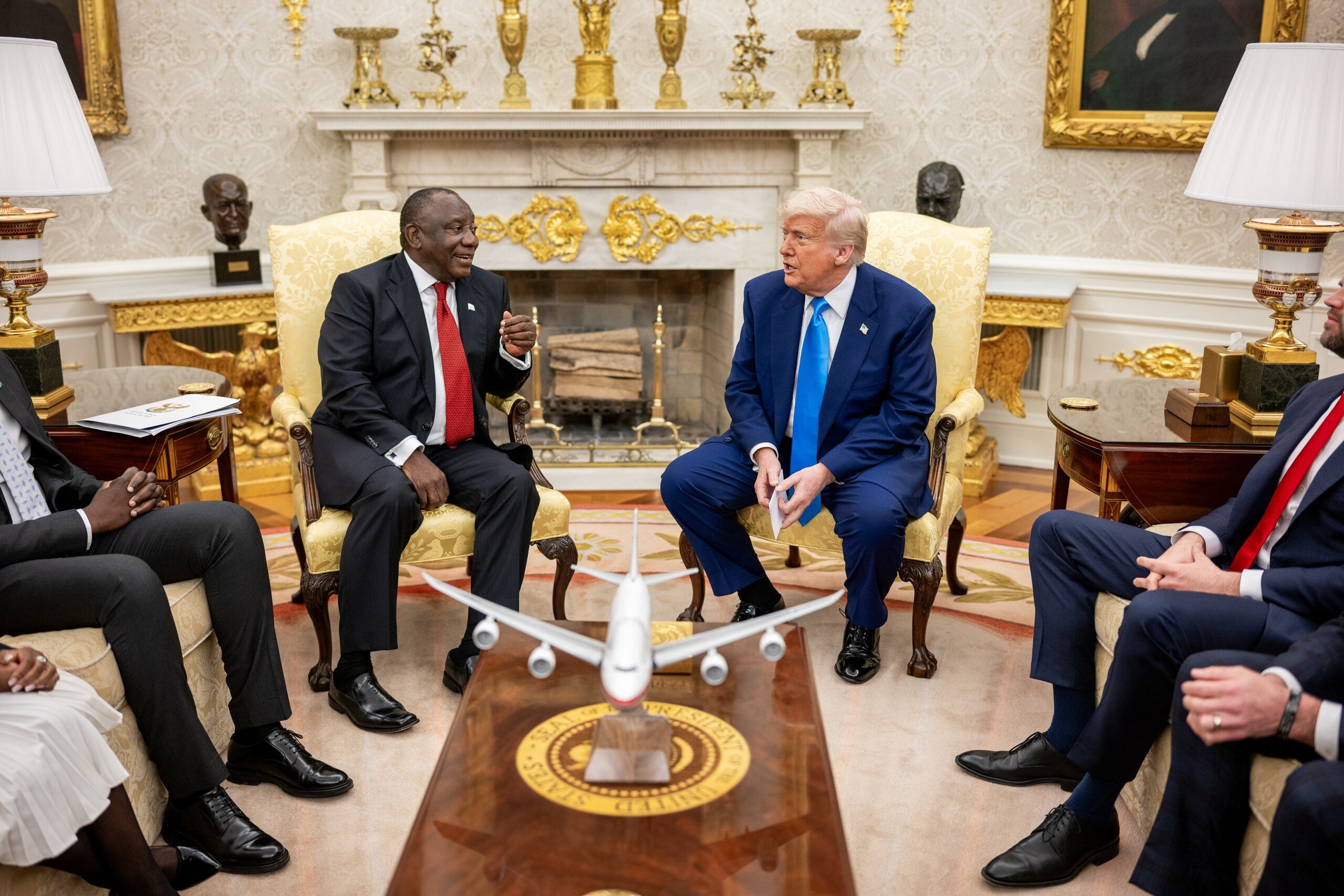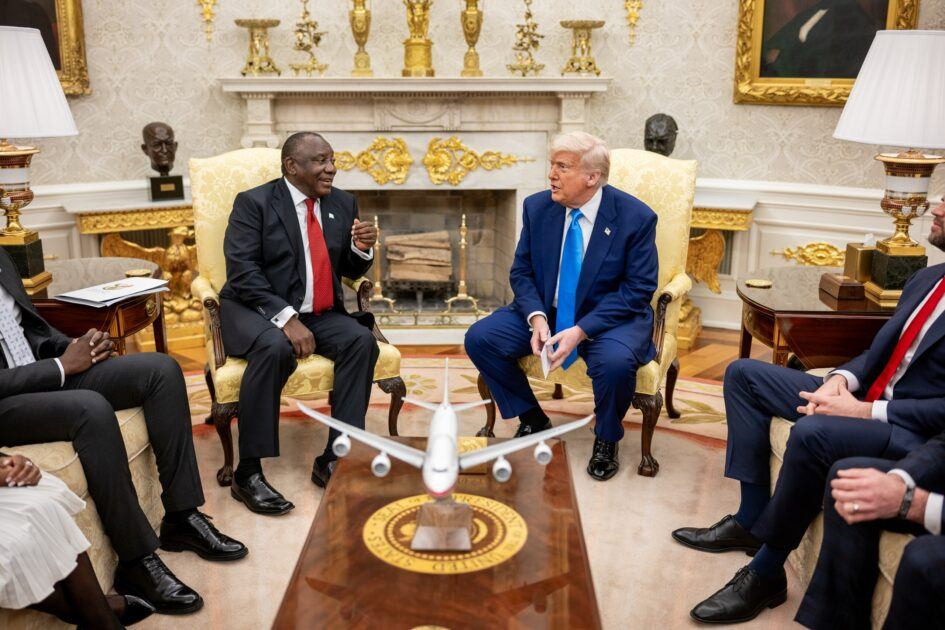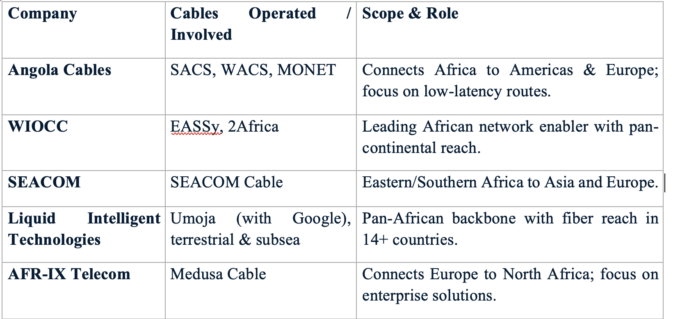






























































Photograph Source: The White House – Public Domain
Introduction: How Far the U.S. Has Fallen
Leaders of countries from all parts of the world have sought to have an audience with President Donald Trump after he unveiled expansive new tariffs in a major escalation of his trade war. He referred to the tariffs as a “declaration of economic independence.”[1] On April 9, 2025, using national emergency powers, Trump announced 10 per cent tariffs on all imports into the United States, and even higher tariffs on goods from about 60 countries or trading blocs that have a high trade deficit with the US. After the inauguration on January 20, the White House had been sending out statements on the imposition of new tariffs and leaders from far afield as Canada – Mark Carney, Japan – Shigeru Ishiba, Italy – Giorgia Meloni, Keir Starmer – United Kingdom, and Cyril Ramaphosa – South Africa, visited the White House to lobby the U.S. government to grant special dispensation to their countries. Of these visits one outlet from Washington, The Hill, noted that,
“President Trump has turned Oval Office meetings with foreign leaders into diplomatic thrill rides which at times have crashed, à la Ukrainian President Volodymyr Zelensky, and at other times have been surprisingly smooth sailing…”
Cyril Ramaphosa’s visit was not as difficult as Zelensky’s, but there was a clear effort by the U.S. president to surprise the South African leader. Both the Zelensky and Ramaphosa visits were seen as ambushes by some observers.” [2]
This commentary will agree that the President of South Africa was ambushed but would differ on the evaluation of the outcomes. In 1994, South Africa emerged from over 300 years of oppression from a system called apartheid that had been determined to be a ‘crime against humanity.’ Some of those who believed that Blacks are naturally inferior left South Africa after the system was disgraced, defeated and discredited. President Nelson Mandela and Bishop Desmond Tutu assisted in establishing a new political ethos in the society, one based on the spirit of Ubuntu. At the philosophical level, Ubuntu meant forgiveness and reconciliation, but at the economic level, the South African economy was still dominated by a small white minority. There were fringe elements from this minority who formed an extreme group called AfriForum. One former citizen of South Africa, Elon Musk, emerged as one of the richest people in the world and used his wealth and electronic platforms to reproduce the talking points of ‘white genocide.’
President Ramaphosa arrived in the United States with a large delegation to discuss tariffs, trade and investment, but the President of the United States wanted to discuss what he termed the ‘white genocide in South Africa.’ Two weeks earlier a group of 59 white South Africans, primarily Afrikaners, were granted refugee status and admitted to the U.S. after their applications were expedited. The U.S. refugee resettlement program has been largely suspended, leaving hundreds of thousands of other refugees who have been approved for resettlement stranded.
President Trump’s administration has stated that the Afrikaners are being persecuted in South Africa due to their race, alleging a form of “genocide”. This claim that has been trumpeted by the far-right white supremacists inside and outside of South Africa is denied by the South African government. As one commentator noted in the British newspaper, The Guardian:
So here we have a man who has the mighty US state department, the wily Central Intelligence Agency and numerous other resources at his beck and call to help him discern the truth, relying on a badly made propaganda video sourced from a racist, rightwing, anonymous South African X account. Instead of embarrassing Ramaphosa on Wednesday, Trump merely illustrated just how low the US has fallen.[3]
Limitations of Black Empowerment in South Africa.
When Nelson Mandela walked out of Victor Verster Prison on 11 February 1990, after being incarcerated for 27 years, he was met by Cyril Ramaphosa who was then a prominent trade union leader and rising figure in the African National Congress (ANC). Ramaphosa was one of the crucial negotiators on behalf of the Black majority rule after the white South African army had been defeated at Cuito Cuanavale in Angola. In 1991, Ramaphosa was elected Secretary General of the African National Congress (ANC) and became the chief negotiator for the ANC during the Convention for a Democratic South Africa (CODESA) talks with the apartheid government.
Ramaphosa was one of the architects of the New Constitution and he played a leading role in drafting South Africa’s post-apartheid Constitution, helping to shape the legal and democratic framework of the new nation. This framework guaranteed the continued economic dominance of the minority whites ensuring the sanctity of private property and the lopsided gap in wealth. When Thabo Mbeki was chosen as the successor to Nelson Mandela and became President in 1999, Ramaphosa went to the private sector and in short order became a billionaire. His brother-in-law Patrice Motsepe also went into business and these elements promoted Black Economic Empowerment (BEE) in South Africa. In 2003, the policy was expanded into Broad-Based Black Economic Empowerment (B-BBEE) through the B-BBEE Act (No. 53 of 2003), which emphasized not just ownership but also skills development, employment equity, and enterprise development.
One section of South African capital in banking, mining, agriculture, wineries and telecommunications supported this alliance with new Black entrepreneurs such as Ramaphosa and Motsepe. Older branches of white capital that had been entrenched in the apartheid economy were being challenged by newer entrants who cooperated with the Black billionaires. South Africa’s richest man, the billionaire Johann Peter Rupert represented this newer branch of capital called the Stellenbosch Mafia and it was not accidental that he accompanied Cyril Ramaphosa on his trip to the White House in May 2025.
Exiles from South Africa Decamping to the United States – Pay pal mafia
The United States and the European Union had invested more than one billion dollars in the transition process in South Africa in order to groom a new class of Africans such as Motsepe and Ramaphosa. International capital had learned from the Diversity, Equity and Inclusion (DEI) policies in the United States that the promotion of a class of successful Blacks would be a safety valve for the social system. The ANC had promised the restructuring and transformation of the economy after apartheid, but the ‘international donors’ and the neo-liberal planners promoted GEAR—short for Growth, Employment and Redistribution—as a macroeconomic strategy adopted by the South African government in 1996. This strategy promoted liberalization, privatization, ‘good governance’ and removing regulations that sought to bring safety and security for the working poor of South Africa. The full impact of this privatization and following the recommendations of the international banking and financial institutions could be seen in the inability of the society to produce electricity on a regular basis. Insecurity and interpersonal crimes increased under these economic policies. The figures on the extent of crimes are produced ad-nauseum, but Patrick Bond has noted that very few of these commentaries reflect on the financial crimes and financial outflows that rob the society of needed investment capital.[4]
There were elements from the apartheid society who opposed any openings such as Black Economic Empowerment. Among these were a small group of capitalists who later became known as the PayPal Mafia. Among these elements were figures such as Peter Thiel, Roelof Botha, David Sacks and Elon Musk. These were now billionaires in the United States who had left South Africa after Black majority rule. They made billions of dollars out of the new era of tech start-ups linked to the intelligence and military sectors of the US economy. In-Q-Tel, the venture capital arm of the CIA, had been a partner to Peter Thiel who founded the defense contracting firm Palantir.[5]
Peter Thiel and Elon Musk are two of the more outspoken supporters of the ideas of white supremacy and Black inferiority. After Elon Musk became the world’s richest person, the New York Times ran an article on the Inner circle of Elon Musk.[6] This journalistic analysis of the friends of Musk detailed the ideas and thinking of those former South African citizens who were now in the inner circle of Elon Musk and Donald Trump.
Future historians will bring to light the full details of the gathering at the home of David Sacks that birthed the alliance of these billionaires for the Donald Trump Presidential campaign in 2024.[7] For now, readers will have to be content with the fictional representation of the alliance between the techbros and the MAGA forces as depicted in the film, Mountainhead.
When Donald Trump became president in 2025, David Sacks became the White House AI and Crypto Czar in the administration. In this position, David Sacks is shaping U.S. government policy on artificial intelligence and cryptocurrency. Sacks represents the aggressive position of the new oligarchs who believe in white supremacy and seek to wrest control from the old financial barons of Wall Street and the industrial capitalists of the military industrial complex who have dominated the military contracting system. Under the influence of Sacks, the President of the United States has flipped from being an opponent of crypto currencies to an avid promoter of blockchain and digital finance. David Sacks and others from the former apartheid-era South African diaspora appear to view the end of white minority rule in South Africa as a mistake—an outlook that parallels their opposition to Diversity, Equity, and Inclusion (DEI) initiatives in corporate governance, education, and public policy. David Sacks and Elon Musk are reported by the New Yorker to belong to that worldview where discussion of reversing the economic injustices of apartheid is seen as an attack on whites.[8]
Thus, when organizations such as AfriForum lobbied internationally among white nationalist organizations, they found a receptive group around the Trump White House. AfriForum has lobbied internationally, including in the U.S., to raise concerns about genocide of whites in South Africa. They compiled documents and images about land expropriation without compensation and gained receptivity to their ideas resulting in the granting of refugee status to white Afrikaners. This background will assist the reader in understanding the ambush of President Cyril Ramaphosa when he visited the White House on May 21, 2025. President Donald Trump harangued the President of South Africa about white genocide and showed clips of purported attacks on whites in South Africa.
The Rise and Rise of Elon Musk
“The South Africa into which Musk was born in 1971, and to which Thiel moved as a child from Germany, was led by a Prime Minister, John Vorster, who had been a general in a fascist militia three decades earlier that allied itself with Hitler.”[9]
According to Forbes’ Real-Time Billionaires List, Elon Musk is worth $389 billion as of 29 April 2025. As noted above, Elon Musk left South Africa at the very moment when other entrepreneurs, such as billionaire Johann Peter Rupert, were displacing the Oppenheimer and Anglo-American capital. Biographers and cultural critics have been writing about the rise of Musk and its influence in all spheres of U.S. political and economic life. Space does not allow for the outlines of his ventures in technology, space exploration, and social media. His journey began with co-founding PayPal with Peter Thiel and later expanding into electric vehicles with Tesla, space travel with SpaceX, Starlink and social media with X (formerly Twitter). These ventures have not only made him the world’s richest person but also one of the most powerful politically. Musk has not been shy in reproducing the vilest white racist ideas about the inferiority of non-whites and Africans in particular.
In the case of Africa, the company Starlink, the satellite internet service developed by SpaceX, poses a direct and multifaceted threat to established telecommunications companies across Africa. Traditional telecoms rely on fiber-optic cables, cell towers, and ground stations, which are expensive and slow to deploy—especially in rural or remote areas. On the other hand Starlink’s low-Earth orbit (LEO) satellites deliver internet directly to user terminals, bypassing national infrastructure and reducing dependency on local Internet Service Providers (ISPs).
One branch of South African capital that has expanded exponentially in the past twenty-five years has been in the area of telecommunications. One South African company, MTN, made billions of dollars in providing cell phone service. In the midst of the profitability of the telecommunications companies in Africa, Starlink arrived, which threatens the old alliances between these telecommunication companies and the companies that provided fiber optic cables for Africa.
Key Submarine Network Operators in Africa

Recent Developments & Trends (2024–2025)
+ Cable Disruptions: Major outages in early 2024 impacted WACS, SAT-3, and ACE, causing regional internet slowdowns in West and Central Africa.
+ Google’s Umoja Project: Announced in 2024, this Kenya-Australia cable aims to boost East Africa’s connectivity resilience and redundancy.
+ Meta’s 2Africa Expansion: As it nears completion, 2Africa is set to redefine Africa’s global internet capacity—linking 33 countries across Africa, Europe, and Asia.
+ Equinix Investment: Acquisition of MainOne signals growing global interest in Africa’s digital infrastructure and data center market.
The planning of Space X and Starlink posed a direct threat to the established telecommunications companies. Additionally, the military capabilities of the United States to dominate the peoples of Africa would be greatly enhanced. Already there had been the massive opposition to the surveillance and training schemes of the United States Africa Command all across Africa. Former Nelson Mandela had been at the forefront of opposing the Africa Crisis Response Initiative, the forerunner of the US Africa Command, (AFRICOM.[10]
Breaking the back of Black Economic Empowerment in South Africa
President Cyril Ramaphosa included a number of whites in his delegation, especially his Minister of Agriculture and Johann Peter Rupert from the Stellenbosch group of capitalists. These are the barons of capital in South Africa who are to be found in banking and financial services, healthcare and pharmaceuticals, telecommunications and media, industrial and infrastructure development, consumer goods and food production. They represent a section of South African capital that was not aligned to the interests of David Sacks and Elon Musk. One report from Counterpunch noted that Johann Rupert told Trump that “the issue is about crime, poverty, and unemployment, not “white genocide.”[11] Rupert said even though he is one of South Africa’s most hated men, he sleeps on his own farm with his doors unlocked.
Patrice Motsepe had ingratiated himself with enough members of the Milken Group that he had been able to establish Milken-Motsepe Prize Program, a collaborative effort to support innovation and entrepreneurship in Africa. Motsepe took credit for ensuring the visit to the Oval Office took place, but he was unable to predict that Elon Musk was attacking the very foundations of his rise to be a member of the billionaire class. Under South African Law, the profitable telecom sector requires that companies allocate at least 30 per cent ownership to historically oppressed blacks under BEE laws. We now know from the press conference that was held by Ramaphosa after the Oval office ambush that Elon Musk’s Starlink has refused to comply, calling the MBEE requirement “openly racist” and blaming it for delays in launching the service. It was therefore not by accident that when President Cyril Ramaphosa visited the White House, Elon Musk was right there with the other leaders of the Trump MAGA administration. We now know from the Press conference held by President Cyril Ramaphosa after the oval Office meeting that his concession to Musk and Starlink took place outside of the view of the camera.[12]
The clarity of the capitulation of Cyril Ramaphosa came from the statement of the South African Confederation of Trade Union (SAFTU). In “SAFTU Condemns Imperialist Blackmail Disguised Diplomacy in Ramaphosa’s Secret Deal With Trump,” A statement issued on behalf of SAFTU by General Secretary Zwelinzima Vavi noted:
Let us be clear: SAFTU does not support the current B-BBEE model. It has created a tiny Black elite while the vast majority of Black South Africans remain poor, unemployed, and excluded. But the answer is not to capitulate to billionaires – the answer is to demand a real socialist transformation of the economy, based on worker ownership and democratic planning.
SAFTU demands:
1. Full public disclosure of all agreements reached during the Washington visit.
2. Immediate reversal of the decision to drop the 30% B-BBEE requirement for Starlink or any other corporation.
3. A parliamentary inquiry into the conduct and mandate of the Ramaphosa delegation.
4. Mass mobilisation to resist this new wave of economic imperialism and defend South Africa’s sovereignty.[13]
This was not foreign policy. This was an imperialist operation dressed up in diplomatic clothing. The working class must rise in defence of the country’s independence – and we will not be silent while our future is auctioned to the highest bidder.[14]
Contradictions and the laws of unforeseen circumstances
The visits of the leaders of different countries exposed the levels of instability, uncertainty and anxiety that has entered the international political economy. The closest ally and neighbour of the U.S., Canada, has been most vocal in critiquing the Trade Policies of the Trump Administration. Prime Minister Carney of Canada has strongly criticized Trump’s use of tariffs, arguing that they disrupt global trade and harm both the U.S. and its trading partners. It is now known that Canada allied with the European Union and the Japanese to orchestrate a sell off of U.S. bonds that has now intensified uncertainty in the market for U.S. bonds. The more the uncertainty and the narrowing of the field of accumulation, the more the United States proposes the annexation of Canada, Greenland and the Panama Canal. Military threats undermine trust hence the U.S. under Trump seeks to completely dominate the oil rich states of Qatar, Saudi Arabia and the United Arab Emirates so that their massive energy resources will be able to power the accelerating AI economy with its increasing link to military might. Numerous commentators have recognized the accelerated and recursive nature of the new process of political and economic retrogression in the United States.[15] It has devolved to scholars rooted in the radical anti-racist traditions to boldly spell out the full implications of the meaning of the overt anti-black racism that now emanate from the Trump White House.[16] Robin D. G. Kelley has noted that there is the need to revive the idea of solidarity to mobilize the abandoned working class.[17]
In this new world of uncertainty, the Trump administration needs to have complete control over African resources and the youthful energies of Africans. While Cyril Ramaphosa may have capitulated to the White House and Elon Musk over the issue of Black Economic Empowerment, the recent history of the struggles against apartheid has placed the South African society at the forefront of the legal and diplomatic challenges to the Israeli genocide in Gaza. On 29 December 2023, South Africa filed an application at the International Court of Justice (ICJ), arguing that Israel’s military actions in Gaza violated the Convention on the Prevention and Punishment of the Crime of Genocide.
The ICJ did not rule on whether genocide had occurred but found that South Africa had standing and that its claims were plausible. The court ordered Israel to:
+ Take all measures within its power to prevent acts of genocide.
+ Ensure its military does not commit genocidal acts.
Yet, at the end of May 2025, the campaign of killings by the Israel Defense forces has reached the point where states such as France, Britain, Canada and Germany have joined in the condemnation of the killings and starvation. This bold act of the South African government carried deep symbolic and legal weight, especially given South Africa’s own history of apartheid and its moral positioning in global human rights. Critical commentators in South Africa have argued that the South African government should do more by ceasing all trade with Israel, including ending the shipment of coal to Israel.
In the United States, the MAGA administration has exposed the hollowness of the so-called rules based economy underlying multilateral cooperation and agreements. Not even the ruling of the U.S. Court of International Trade seems to have dissuaded the Trump Administration – the Court of International Trade rule on May 28, 2025 that said the president had overstepped his authority under the federal emergency powers law he invoked.[18]
Where the legal mechanisms may fail, the contradictions of the technological leaps of the era of artificial intelligence and Starlink may be too toxic for the society to contain. The social and economic power of Elon Musk and the Starlink system has reached the point where even the generals of the U.S. military are at the mercy of Elon Musk.[19]
SpaceX has been developing a military version of Starlink called Starshield, which offers enhanced security and redundancy for military communication. In Ukraine, the Pentagon found that their communication system with the Ukrainian military had been held hostage by Elon Musk. The U.S. military is increasingly reliant on Starlink, particularly for military communication. This dependence on the tech billionaire brings back the question of socialized companies.
At what point does the power of a company reach where it can no longer be in private hands?
More than a century ago, it was acknowledged that water, electricity and gas companies had to be regulated because of the needs of society. The power of the working people reached the point where indoor plumbing and electricity were seen as nonnegotiable needs. In the present era of telecommunications and data systems, the South African state and society is caught between the needs of the people for water, electricity and telecommunications and the needs of a class of billionaires in the U.S. who will use all powers available to achieve their goals. Cyril Ramaphosa, even while becoming a billionaire himself, had fallen amid these struggles.
These are contradictions that are bigger than Elon Musk and Donald Trump on one side and Patrice Motsepe, Cyril Ramaphosa and Johann Peter Rupert on the other. The recent histories of the struggles against apartheid, authoritarianism, genocide and fascism are still too fresh in the minds of humans for Trump and Musk to think that history is on their side.
Endnotes
[1] https://www.youtube.com/watch?v=rbmf_xbSCs8
[2] https://thehill.com/people/cyril-ramaphosa/
[3] https://www.theguardian.com/commentisfree/2025/may/23/trump-ramaphosa-south-africa-meeting
[4] https://www.bbc.co.uk/sounds/play/p0ld2v28
[5] John Mac Ghlionn, “The Most Terrifying Company in America Is Probably One You’ve Never Heard Of,” Faily Beast, May , 26, 2025, https://www.thedailybeast.com/the-most-terrifying-company-in-america-is-probably-one-youve-never-heard-of/ See also Alex Karp and Nicholas W. Zamiska , The Technological Republic Hard Power, Soft Belief, and the Future of the West, Crown Currency, 2025
[6] https://www.nytimes.com/interactive/2024/12/23/business/elon-musk-trump-family
[7] https://www.nytimes.com/2024/06/06/us/politics/trump-sacks-silicon-valley-donors.html
[8] https://www.newyorker.com/news/q-and-a/make-south-africa-great-again
[9] https://www.theguardian.com/technology/2025/jan/26/elon-musk-peter-thiel-apartheid-south-africa
[10] Horace G. Campbell, “Fighting Racism in the U.S. Military: Dismantling the United States Africa Command,” African Review, November 7, 2024
[11] https://www.counterpunch.org/2025/05/23/white-lies-about-white-genocide/
[12] https://www.youtube.com/watch?v=o6MZLnCXvEE
[13] https://www.counterpunch.org/2025/05/23/white-lies-about-white-genocide/
[14]https://saftu.org.za/archives/8957
[15] Alfred McCoy, “Is 2025 the New 1984?”, Counterpunch, April 14, 2025. https://www.counterpunch.org/2025/04/14/is-2025-the-new-1984/
[16] Rebecca Gordon, Donald Trump’s War on Black People, Counterpunch, May 21, 2025
[17] Robin D.G.Kelley,” Notes on Fighting Trumpism, Boston Review, November 12, 2024https://www.bostonreview.net/articles/notes-on-fighting-trumpism/ and see also Clarence Lusane, Making America White Again: The Deafening Silence of Black MAGA, Counterpunch, March 28, 2024
[18] https://www.bbc.com/news/articles/c8xgdj9kyero
[19] https://thehill.com/policy/defense/4193788-musk-acknowledges-he-turned-off-starlink-internet-access-last-year-during-ukraine-attack-on-russia-military/
The post Trump’s White House Ambush of Cyril Ramaphosa appeared first on CounterPunch.org.
This post was originally published on CounterPunch.org.